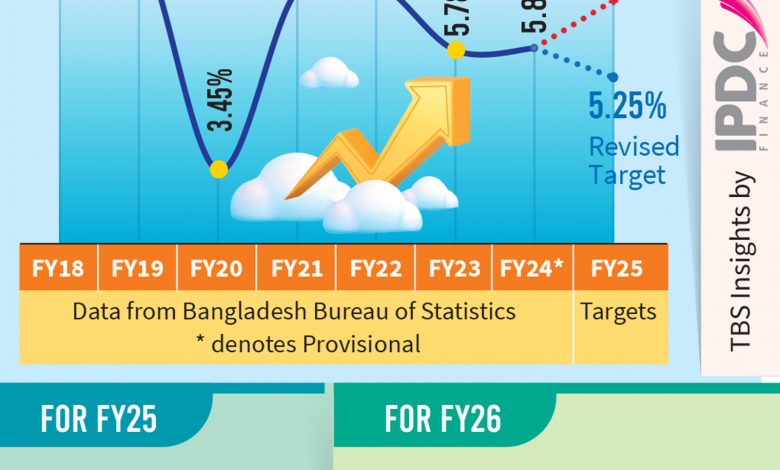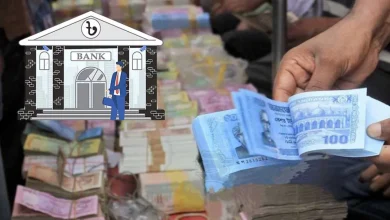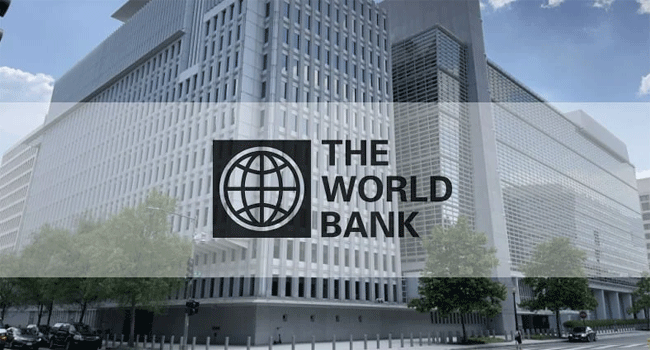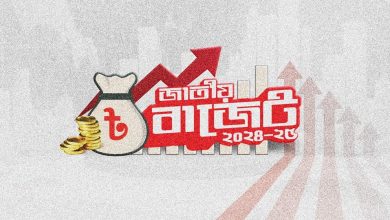Govt lowers FY25 GDP growth forecast to 5.25%, estimates inflation at 9%

The government has revised its GDP growth projection for FY25 downward to 5.25%, from the initial estimate of 6.75%, due to the ongoing financial crisis, business slowdown, and political volatility following the recent change in government.
Additionally, the inflation rate, which has remained in double digits since October, is projected to ease slightly to 9% by the end of the fiscal year. The FY25 budget, prepared by the previous Awami League government, had estimated inflation at 6.5%.
In a meeting of the Coordination Council on Budget Management, chaired by Finance Adviser Salehuddin Ahmed at the Secretariat yesterday, the overall budget was reduced by Tk30,000 crore to Tk767,000 crore, primarily by excluding politically-driven projects from the Annual Development Programme (ADP).
The FY26 budget is initially set at Tk820,000 crore, 2.9% higher than the original budget for the current fiscal year but 6.9% higher than the revised budget, marking the smallest budget increase in history, according to sources at the meeting.

A senior finance official, seeking anonymity, told TBS that the meeting focused more on stabilising the banking sector and stock market than revising budget estimates as the government prioritises financial sector stability, with the finance adviser urging ministries to act responsibly.
He added that the governor expressed deep dissatisfaction with the banking sector during the meeting, while the National Board of Revenue chairman acknowledged that achieving revenue targets would be unrealistic.
The current fiscal year, which began on 1 July, was budgeted by the ousted Awami League government. The interim government took over on 8 August, a month and eight days into the fiscal year.
Anti-government protests had started in early June, and after the AL government fell on 5 August, development projects stalled. Most local contractors suspended work while foreign contractors fled the country. Many projects could not resume until September, with activities gradually resuming since then.
A finance ministry official told TBS that while more savings will be made from the ADP, additional expenditures will be required for loan interest payments, the treatment and rehabilitation of July movement victims, aid for flood-affected people, and repairs to roads and infrastructure.
It is estimated that interest payments on loans in FY25 will rise by about Tk15,000 crore due to higher interest rates on various government bonds, with the government borrowing at rates of up to 12.75%. Additionally, interest expenses are increasing due to the higher foreign exchange rate.
In the FY25 budget, the government has allocated Tk1,13,500 crore for interest expenses, including Tk93,000 crore for domestic loan interest and Tk20,500 crore for foreign loan interest.
The official said the government will not significantly cut development spending as maintaining GDP growth and job creation remain key priorities.
‘Revised projections optimistic’
Economists said even the downwardly revised GDP growth and inflation projections appear overly optimistic and challenging to achieve given current economic indicators.
Dr Zahid Hussain, former chief economist at the World Bank’s Dhaka office, told TBS that an inflation estimate of 9% would be “optimistic”.
He said the current inflation rate is above 10%. While global commodity prices are declining, the experience of the past two years has shown that these reductions have not translated into benefits for Bangladesh. Despite significant drops in the global prices of fuel oil, gas, coal, and iron products, inflation has risen in Bangladesh. This, he believes, could be due to the exchange rate.
“The exchange rate has remained stable for the past one and a half months, and the monetary policy is also supportive of controlling inflation. Given this, inflation should ideally decrease. However, the lack of competition in the market, along with extortion and syndicates in the supply chain, continues to drive up food inflation. Considering these factors, I do not see much change in inflation,” he said.
Zahid also expressed scepticism about achieving 5.25% GDP growth, calling it overly optimistic.
“Only two indicators are showing positive trends, while all other indicators are poor. Remittances increased by 14% from July to November, and exports were strong in October. However, there has been no growth in revenue collection, crop damage due to floods, and stagnation in the industrial sector caused by political uncertainty and mob justice,” said the economist.
Given these circumstances, even a 4% growth would be a positive outcome, he said, adding that political instability does not seem to be resolving anytime soon.
Taming inflation a priority for FY26
An official involved in budget formulation told TBS that the second Coordination Council meeting will take place in April next year, at which the revisions for the current fiscal year’s budget and the new budget for the next fiscal year will be finalised.
The official emphasised that controlling inflation will be a key priority for the next fiscal year, with a continued contractionary monetary policy and government austerity measures.
As inflation decreases in major import markets such as China and India, the cost of imported goods is expected to fall, although total imports will remain unchanged, leading to increased supply, he said.
A positive growth of 10% to 12% in remittances and increased export earnings are anticipated, helping to maintain foreign exchange reserves at IMF targets and stabilising the exchange rate, said the official.
For the current fiscal year, the government expects to receive $4 billion in budget support from the World Bank, the Asian Development Bank, and other development partners, with $2 billion expected by December.
Additionally, the government is prioritising savings certificates and treasury bills outside the banking system to finance the deficit, he added.







